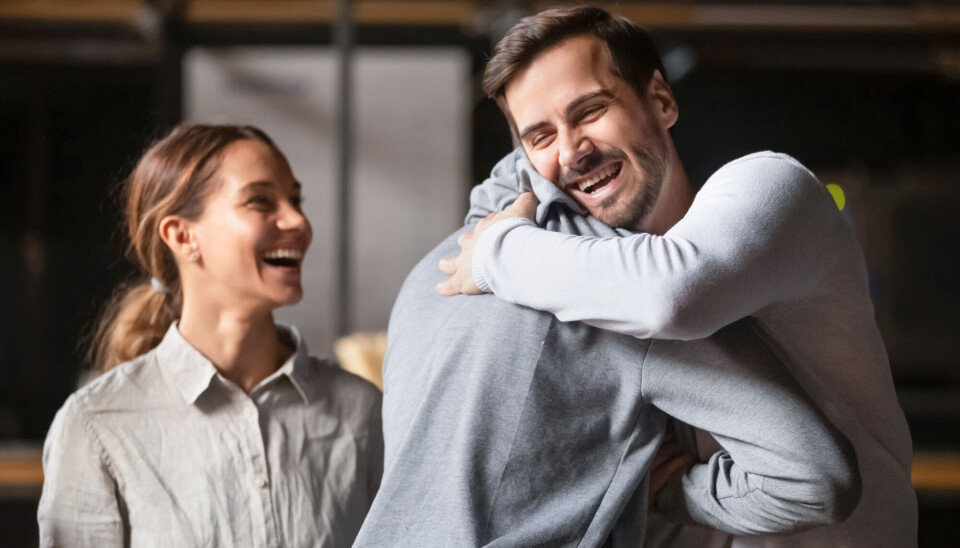
Hugs are back in Norway
As Norwegians get back to hugging, the numbers of deaths due to Covid are also at peak. Why does one researcher say that this is completely fine?
Will we ever hug again? we asked. Will the handshake return? Is the age of physically touching strangers over?
We weren’t even hugging our parents.
After two years of keeping our distance, home officing, keeping grandchildren away from grandparents, covering up with face masks, isolating, testing and tracing, and three doses of Covid vaccines – the verdict (for Norway anyway) is in:
Hugs are back.
Highest hugging numbers so far
Norway removed several Covid measures on February 1st, and most of the remaining measures on 12 February.
Fast forward a couple of months, and we are back to rubbing our cheeks with friends and strangers.
Seven out of ten Norwegians hugged somebody they don’t live with last week.
“We haven’t been close to hugging numbers like this in Norway during the pandemic, not even during various phases of opening up society”, says senior adviser Nora Clausen from Opinion.
When the pandemic struck early in 2020, analytics company Opinion quickly established a panel of respondents that have answered questions throughout the pandemic. The Norwegian Corona Monitor has kept up with people’s opinions about various Covid issues, such as hugging.
Out of the 46 000 Norwegians who were asked, 70 per cent responded that they had hugged somebody they do not live with during the past week, Opinion writes in a press release.
This is a doubling of the numbers compared to February.
Young people under 30 are the most eager huggers – 83 per cent of them had given out hugs. The lowest number of hugs were given by those over 60 – at 59 per cent.
The best possible protection
On a more somber note, the past few months have also seen record high numbers of Covid-related deaths in Norway.
According to faktisk.no, a total of 2871 Covid associated deaths have been registered in Norway up to 17 April. Just over half of these died during the last four months.
Does this mean that Norwegians should stop hugging?
Not at all, says vaccine researcher Gunnveig Grødeland at Oslo University Hospital.
“Those who are dying currently are the ones who are old and at risk. They typically live in nursing homes and have underlying diseases”, she says.
This is a group of people who are always at risk of serious illness and death when they get respiratory infections, the researcher explains. In other words – they would likely have died from the flu or another similar virus if not for Covid.
“You can’t use this group as a basis for determining behaviour in the rest of society”, says Grødeland.
“What you can do, is to give them the best possible protection. And we have done that now, by vaccinating the population. And these vaccines work so well, that they actually do save most of them”, she says.
Just over 90 per cent of the Norwegian population aged 18 and over have received at least two doses of a Covid vaccine.
In any case – hugging or not hugging would have very little effect on the spread of a virus which is as infectious as Omicron, Grødeland says.
- RELATED: Read about Grødeland's research on a new vaccine to tackle both the flu and Covid in one shot
Safe to go out and eat
In December 2021, the Norwegian government introduced a national ban on serving alcohol in order to try and slow the spread of the Omicron virus. An infamous Christmas party where Omicron spread like wildfire had previously created headlines all over the world.
The ban was lifted on January 13th.
In the Opinion survey from April, 81 per cent of Norwegians responded that they feel safe when they go to cafees and restaurants. As with the numbers for hugging, this is the highest number measured so far.
15 per cent say they do not feel safe.
“Most people are returning to the restaurants and clubs, and cultural life, but it has taken time”, says Clausen.
1 out of 3 respond that they have participated physically at one or more cultural happenings like concerts and the theatre during the last month.
Ready to face a winter wave
The survey also asks the question ‘Do you think that Norway will be done with this pandemic in 2022?’.
21 per cent answer yes.
64 per cent say no, while the rest say they don’t know.
“Despite all the vaccinations and infections that so many have been through, it seems most people are prepared for new mutations and Covid waves when winter comes”, says Clausen.
Vaccine researcher Grødeland however, is fairly certain that we won’t need to shut down society or implement other far-reaching measures.
“Our immune response now, after vaccinations and infections, means that we are well protected. It’s important that those at risk get a top-up dose this fall. With that, I believe we are ready to face whatever variants and mutations may come, without shutting down”, she says.
































